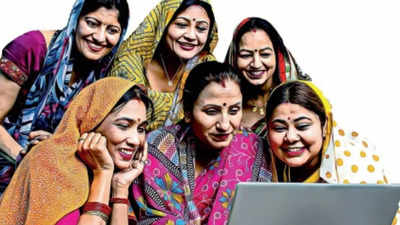- News
- City News
- ahmedabad News
- Women empowerment index: Gujarat’s districts fare better in land ownership by women
Trending
Women empowerment index: Gujarat’s districts fare better in land ownership by women
The Women Empowerment Index from IIM Ahmedabad indicates that Gujarat performs better than the national average in women's land ownership and financial decision-making. However, unpaid work remains problematic, with only 32% of districts showing work-life balance for women. The index aims to pinpoint areas needing concentrated efforts.







The percentage was slightly higher at 5.6% when it came to Gujarat. Out of 33 districts, 12 had a higher percentage than the national average.

These were some of the insights from the analysis by experts at
IIM Ahmedabad (IIM-A) as the findings of the maiden Women Empowerment Index were shared on Friday. It is an initiative of the Gender Centre at IIM-A where executive committee members include Prof Vidya Vemireddy, Prof Kathan Shukla, Prof Namrata Chindarkar, Prof Vaibhavi Kulkarni, Prof Pritha Dev, and Prof Rama Mohan Turaga. The launch at the B-school also saw a panel discussion including representatives from industry and academia.
Major takeaways from the index include better decision-making and autonomy over income and physical mobility, and control over income and economic empowerment. However, unpaid work has remained a major issue with only 32% of 672 districts under study showing work-life balance for women.
Prof Vemireddy, the chairperson of the Centre, told TOI that the empowerment of women can be seen from several perspectives. "But some of the measures could be how they are making their choices, spending time for their own or others' betterment, agency over resources, and education among others. Understanding the combination of these parameters can give the sense of women empowerment," she said.
The index is prepared based on secondary datasets from the National Family Health Survey, National Crime Records Bureau, Ministry of Statistics and Program Implementation, and Election Commission of India to name a few.
"The picture that emerges from the data is mixed — we have chosen districts as the analysis unit as every region is unique and can be different from adjoining regions. There is surely a change on the ground with govt schemes and civil society efforts, but there are several areas that need focus. The purpose of the index is to point out where efforts need to be concentrated," she said.
End of Article
FOLLOW US ON SOCIAL MEDIA











